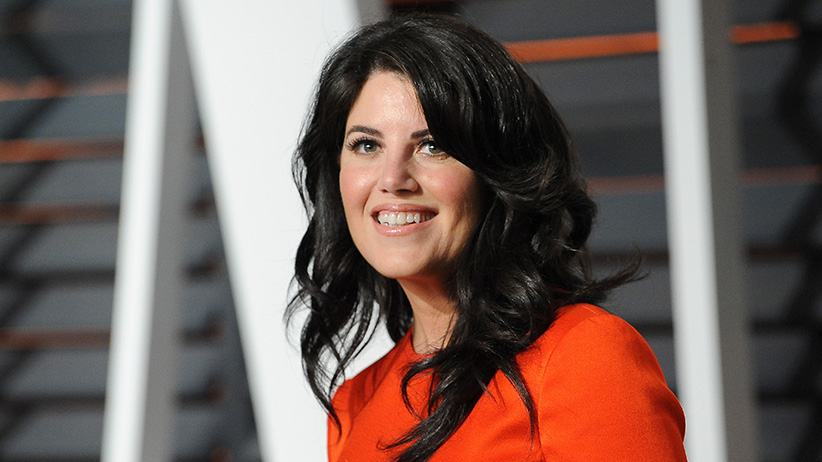Could the Internet have actually saved Monica Lewinsky?
Emma Teitel on why the ‘patient zero of online shaming’ may actually have found salvation in the evolution of the web
BEVERLY HILLS, CA – FEBRUARY 22: Monica Lewinski attends the 2015 Vanity Fair Oscar Party hosted by Graydon Carter at Wallis Annenberg Center for the Performing Arts on February 22, 2015 in Beverly Hills, California. (Photo by Jon Kopaloff/FilmMagic)
Share

Listen to Emma Teitel read her column, or subscribe to Maclean’s Voices on iTunes or Stitcher for on-the-go listening:
The Internet has made us smarter but less moral. That’s the major takeaway from a new study released by the Pew Research Center that recorded attitudes people hold about the web in the developing world. According to the study, a median of 64 per cent in 32 emerging and developing nations believe the web has had a positive effect on education, but only 29 per cent believe it has had a positive effect on morality. Most respondents involved in the study were not regular Internet users, but it’s hard to imagine the results would have been grossly different if they were. It’s difficult to believe that regular Internet users—which is to say almost everyone reading this magazine—would defend the moral fibre of an entity that has us hunched over, day in, day out, hate-reading the status updates of people we hardly know and shamefully seeking out nude photos of Jennifer Lawrence. The World Wide Web has made us more efficient and better connected. But has it made us better people?
Monica Lewinsky, otherwise known as “that woman” of the ’90s, would argue it has not. The former White House intern, whose sexual relationship with former U.S. president Bill Clinton brought her international notoriety, gave an impassioned speech about the deleterious effects of online culture—namely cyberbullying—at a TED conference in Vancouver this week. Lewinsky, now 41 (she was 22 when her relationship with Clinton began), listed the Internet’s positives as a kind of hear-me-out disclaimer: its role as enabler of political revolution, information aggregator and unifier of far-flung loved ones. Her area of expertise, however, lies in the web’s outsized ability to cause harm. “In 1998,” she said, “after having been swept up into an improbable romance, I was then swept up into a political, legal, media maelstrom we had never seen before.” Lewinsky described herself as “patient zero of losing a personal reputation on the global scale almost instantaneously.”
And then she arrived at the crux of her speech: “Fast forward to 2010 and now social media has been born. The landscape has sadly become much more populated with instances like mine . . . The darkness, cyberbullying and slut-shaming I experienced had mushroomed.”
Related: Jon Ronson on his new book, which tracks down victims of online shaming
2010 was the year gay American teenager Tyler Clementi killed himself after his college roommate surreptitiously filmed his intimate relations with another man. Lewinsky pointed to this event and others—the social media shaming of PR professional Justine Sacco, for example—as proof that our impulse to shame online has reached new and terrifying heights. There is something uniquely awkward and disingenuous about an adult woman likening her clandestine affair to the suicide of a gay youth. But Lewinsky’s heart is in the right place. The thesis of her talk, after all, was kindness; that we should care not only about our rights to freedom of speech, but our “responsibility to freedom of speech.”
The great irony? It is precisely the modern Internet Lewinsky disparages that might have spared her the cataclysmic shame she endured in the ’90s. The Internet, still a bedrock of trolls, revenge porn and email scams, may not be an overwhelmingly moral place, as the Pew respondents note, but it is a rapidly evolving one. In 2015, the impulse to shame a gay teen or a young woman in a high-profile tryst doesn’t go unchallenged, because it’s met full force with something that didn’t exist en masse in 1998: the counter-shame.
When American conservative pundit Rush Limbaugh called women’s-rights activist Sandra Fluke a slut for demanding wider birth control coverage in the United States in 2012, and when a slew of nude photos were stolen from the private possession of a large number of female celebrities and leaked online in 2014, the web lit up with fervent defences of the women wronged. These are only two examples; thousands more exist at any given moment every day. Because when online social justice movements—feminist movements in particular—aren’t wasting their time reprimanding men for sitting wide-legged on the subway or trying to ban Robin Thicke songs from university pubs, they do a fantastic job of sticking up for their own. New York Times columnist Maureen Dowd receives far more flak today for her highly contemptuous columns about Lewinsky than she did when they were published in the 1990s.
This is not to say that slut-shaming is less prevalent today than it was 17 years ago, only that it rarely goes unchallenged when it occurs in a public space. Lewinsky, unfortunately, is the product of what may be—gossip-wise—the cruellest period in the Internet’s evolution: a time before social networks helped engineer counter-shaming. A time before the social media safety net.